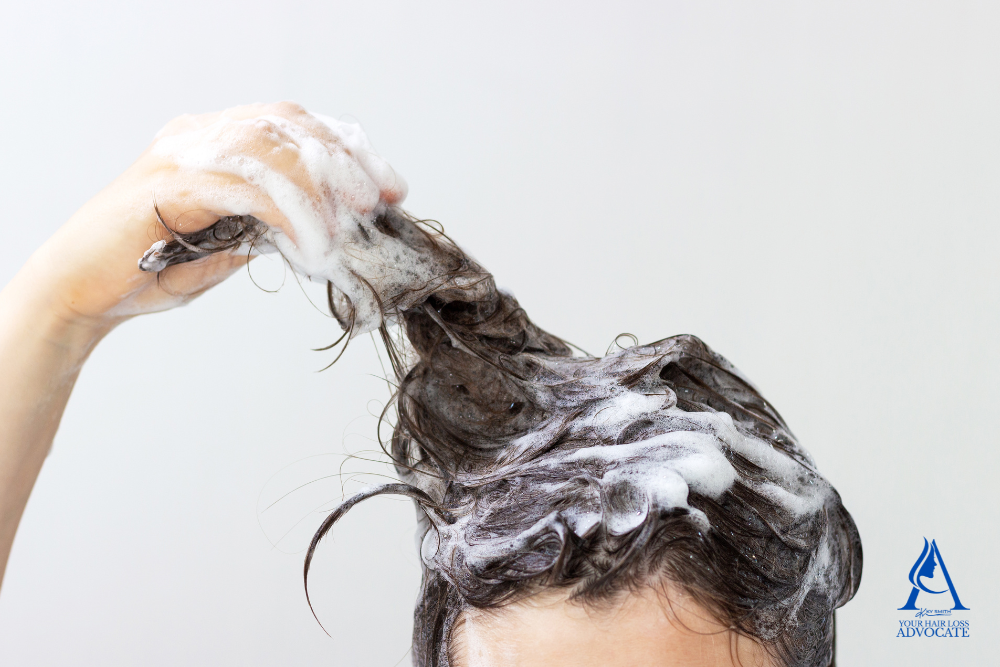What Most Women Get Wrong About Washing & Hair Loss
She stands in the shower, hands frozen at the crown of her head. Heart racing. Because each time she shampoos, more strands swirl down the drain.
It feels like proof that washing is the enemy — that touching, combing, or cleansing is somehow making it worse. So she puts it off. Days stretch into weeks, trying to spare what’s left.
If this is you, know that you’re not alone. I see women in my clinic every single day who are terrified that shampooing is accelerating their hair loss. And I understand exactly why. It’s easy to feel like you’ve lost all control.
But here’s what most women don’t know: avoiding shampooing can actually feed the very problem you’re so desperate to stop.
Why Not Washing Makes Things Worse for Your Scalp (and Hair)
Your scalp is an ecosystem. It’s home to sweat glands, oil glands, good bacteria, opportunistic bacteria, fungi — all of which are constantly competing for balance.
When you stop shampooing out of fear, you allow excess oil, dead skin cells, environmental pollutants, and microbes to build up. This doesn’t just look or smell unclean. It creates a biofilm — a sticky layer where bacteria and yeast can thrive. Over time, this clogs follicles, triggers low-grade inflammation, and interferes with new hair emerging.
In short: not washing doesn’t stop the root cause of your hair fall. It can actually create an even more hostile environment for growth.
Your follicles still shed hair that was destined to shed, driven by signals inside your body. But now they’re trying to push through a congested, inflamed surface — putting them under more stress when they’re already vulnerable.
Where Hair Loss Really Starts — and Why It’s Not Above Your Scalp
Most women think hair loss starts on the surface, where they can see it. But the real story is deeper — literally.
Hair production happens in the middle layer of your skin, the dermis, where your follicles sit. This is where tiny blood vessels feed nutrients and hormones to your hair matrix. It’s where inflammation, circulation, and metabolic signals either support growth or quietly sabotage it.
That means what you’re seeing in your shower drain today was set in motion weeks or months ago, long before you ever touched a bottle of shampoo.
What’s Really Causing This Excessive Shedding?
When hair is falling out diffusely — not in patches, not scarring, just more than usual all over — it’s often called telogen effluvium (TE). It’s incredibly common, especially in women.
Studies published in the International Journal of Trichology suggest telogen effluvium may account for over 30% of female hair loss cases seen in specialty clinics. That number is likely higher, because many women never seek help.
Here’s what sets it off:
- Crash dieting or nutrient depletion: Your body cuts “non-essentials” like hair when it senses scarcity.
- Hormone fluctuations: Childbirth, menopause, thyroid changes, and even coming off birth control can all trigger shedding.
- Acute or chronic stress: Psychological stress spikes cortisol, which changes how your follicles cycle.
- Anesthesia or illness: Major surgeries or viral infections are common triggers, leading to shedding 2-3 months later.
Each of these disrupts the normal growth cycle, pushing more hairs into resting (telogen) phase all at once. Those hairs then shed together, which is why it feels so sudden.
Why Women Lose Their Chance at Recovery Without Knowing It
When you’re not informed about what’s really driving your hair loss — when you believe it’s simply about products or what’s happening on the outside — you unintentionally decrease your chances of true recovery.
Because hair loss is health loss. It’s how your body broadcasts internal strain. If all your energy goes into surface rituals or panicking over washing, you may miss the opportunity to address the actual drivers. Meanwhile, the processes inside — stress hormones, blood sugar swings, gut or liver overload — keep compromising your follicles.
That’s how something that could have been resolved becomes chronic. By the time many women find me, they’ve spent years fighting what they could see, while what they couldn’t see kept undermining them.
How Functional Trichology™ Approaches This Entirely Differently
I’m Ky Smith — Your Hair Loss Advocate™, founder of Functional Trichology™, and head of the Hair Loss Management Center of Houston right here in Cypress TX.
I developed Functional Trichology not to imitate traditional trichology — which often stays on the surface — but to take a rigorous, whole-body approach that maps exactly how your internal systems are impacting your hair.
With excessive shedding, we don’t just give it a name like telogen effluvium and send you home. We trace:
- Whether your adrenals are stuck in high alert, flooding your system with cortisol.
- If your thyroid or sex hormones are underpowered, starving follicles of critical growth signals.
- How well your gut is absorbing nutrients or if your liver is clearing excess estrogen and toxins.
- Where your mineral balance stands — because electrolytes are what keep your cells communicating.
Then we build a precise plan — unique to your body — to calm the storm inside so your hair can get back to growing.
The Truth About Shampooing and Recovery
Cleansing your scalp is actually part of keeping it healthy enough to support new hair. You’re not washing your hair out — you’re creating a clear pathway for your follicles to breathe, so the deeper recovery work has a fair chance.
No amount of shampoo or skipping shampoo will override what’s happening in the middle layer of your skin, where your blood carries hormones, nutrients, and inflammatory signals to your follicles. That’s why working with someone who can decode your internal story — not just sell you a topical — changes everything.
Your Next Step: Start by Listening to What Your Hair is Telling You
If you’re tired of guessing whether you should wash less or wash more, or hoping the problem is only external so it will be easier to solve — this is your invitation to do it differently.
Apply for a complimentary 15-minute Follicle Readiness Call. It’s a private consultation where we determine if your hair loss points to nutritional, hormonal, or stress-driven burdens — and whether a Functional Trichology blueprint is the right next step for you.
Because your hair deserves more than managing appearances. It deserves a strategy that honors how remarkably your body was designed to heal.

